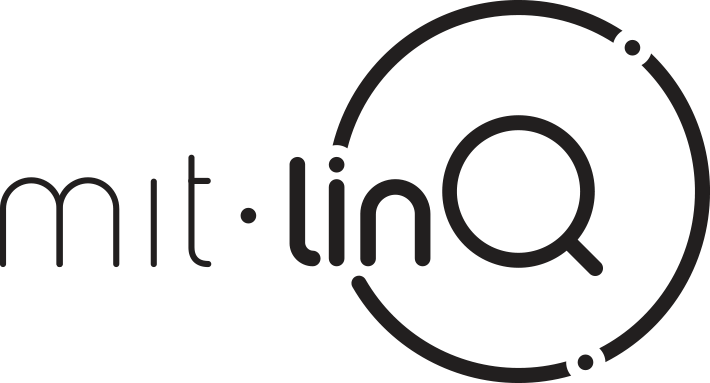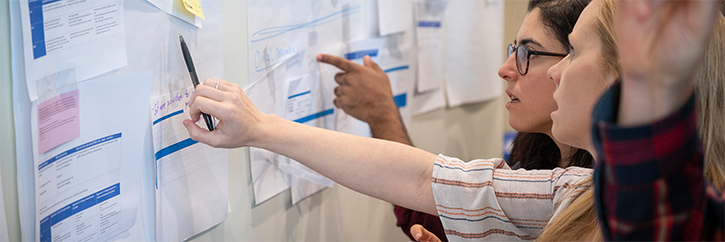Catalyst FAQs
Catalyst has in-person and virtual activities.
During the six-month program, participating Fellows and Faculty will be dispersed nationally. Some of the Fellows and Faculty will be from the local VA and some from outside the VA. Throughout the Catalyst process, Fellows will work in small teams, supported by Faculty and external advisors with diverse backgrounds. Team meetings, workshops and presentations will be held virtually (via Zoom), which has worked well for Catalyst programs since March 2020. Virtual meetings allow for cross-site collaboration on projects.
We are also planning what we call intensifications. These are three 3-day working sessions, planned as in-person events and may require travel to MIT.
Live information session Wednesday, July 16, at 6pm ET Register here
Application and enrollment timetable:
August 4: Cycle 1 Application Close
September 5: Interviews will be held virtually, 10am-5pm ET
October 13: Deadline to respond to admissions for program admittance
Cycle 2
Complete, submitted applications will be considered on a rolling basis. As we have a limited number of slots available for the cohort, candidates are encouraged to complete the app as soon as possible and to be in touch with the program office (catalyst-program@mit.edu).
Fellows are participants in the program who are learning the Catalyst process and doing the work of identifying unmet medical needs, devising and validating solution ideas, planning, and executing research. Fellows profiles typically include PhD students, postdocs, researchers in a company or academia, or clinicians (residents, fellows, attendings) who would like to accelerate the impact of biomedical research. They typically have experience or interest in any domain area linked to health technology: life sciences, engineering, biomedical engineering, data science or any clinical domain. Fellows form what we call an “innovation cohort” and they organically form teams throughout the program.
Generally, we aim to have a cohort of 10-16 Fellows.
Catalyst hopes to have a near equal mix of VA- and non-VA affiliated Fellows. Once accepted into the program, all Fellows participate equally, and we strive to ensure that the experience is consistent among participants.
We welcome applications from individuals at any career stage, including advanced pre-doctoral, post-docs, clinicians, entrepreneurs, and professionals. Typically, Catalyst Fellows are comparatively early in their career, but if you are wondering, just ask.
In 2021, Boston, Memphis, and Salt Lake City are the locations of Catalyst Hubs. These cities were selected in conjunction with the U.S. Veteran’s Health Administration. They are areas that are rich in VA innovation, and have colleges and universities, hospitals and medical centers, and health and technology businesses. Participants from each hub should live or work in close enough proximity to the cities that they can regularly meet in person (when allowable under COVID guidelines).
Each Catalyst hub will have some VA fellows and faculty along with non-VA fellows and faculty. The model is designed to increase interdisciplinary collaboration and to expand connection in the biomedical innovation ecosystem locally and across hubs.
The cohort of Catalyst Fellows will, as a group, investigate medical needs and consider which to pursue; at which point various solutions will be considered. In general multiple fellows will pursue each idea, and each fellow will be involved in investigating several needs. At the conclusion of Catalyst Phase 1, the group of Catalyst Fellows will have developed a portfolio of validated project opportunities. The projects will not necessarily be in an area that you have been working in until this point, though is it highly likely there will be elements of the project that overlap your interests and expertise.
Documents and information you will need to submit in the Application Form include:
- Curriculum Vitae (required)
- Reference letters (required)
- Reference contacts (required; we will not reach out prior to interviews)
- Application questions (previewed below)
Application questions
The objective of these questions is to know more about you and your experiences. Remember that Catalyst will guide and train you to identify and validate unmet needs, define solutions, and design new research projects with high translational potential during the program. You are not applying with an existing project to the Catalyst program; you are applying as a talented and passionate individual with valuable skills to make an impact in healthcare.
Please list your core competencies, including domains of expertise and experience. (75 word max]
Help us understand your CV in context. Tell us about one or two of your non-classroom, professional or research experiences—describe your role in understanding challenges, applying learnings, and influencing outcomes. [150 word max]
Please tell us why you are interested in being a Fellow in the Catalyst Program. [75 word max]
What else should we know about you? (Optional)
Fellows are expected to attend the following activities:
- Sessions: Weekly working sessions will run on Wednesdays from 10am ET to 1pm ET from January 5th to July 1nd, 2026. Weekly sessions will be offered virtually. Additionally, weekly discussion groups will meet online Mondays from 10:00am to 11:00am ET. (Sessions may not run in this format during the three intensifications described below.)
- Intensifications: Fellows are required to participate in the following 3-day working sessions, which may be virtual or involve travel to MIT:
- Intensification I, January 20–22, 2026 — Theme: Need generation/validation
- Intensification II, February 24–26, 2026 — Theme: Solution Generation
- Intensification III, May 5–7, 2026 — Theme: Plan Generation
Fellows are expected to dedicate an average of 10-15 hours/week or 20% time to the regular weekly activities of the program, including Sessions, personal work and teamwork – personal and team work in a flexible schedule format.
For the Intensifications, Fellows are expected to work full time.
There will be one weekly 3-hour session where the group will get together with Faculty to discuss the ideas together, and one 1-hour weekly discussion meeting. Everyone is expected to attend those meetings. The time for the working meetings is Wednesdays, 10am-1pm ET, and the discussion meetings will be Mondays 10am-11am. The Intensifications are required, 3-day, full-time events plus travel to MIT. The remaining time is flexible, depending on the group and project requirements. You will need to be proactive in discussing with your supervisor how to best protect time for group and project work.
If you have a full-time job (or you are currently committed to a full-time activity) and you are willing to reduce your current activity dedication (temporarily, during the program) to participate in Catalyst, you will need your current supervisor’s approval and support, if accepted, before committing to the program. The VA will have a procedure for this, which will be shared when acceptances are sent out.
You can provide your supervisor with information about the program, and explain the commitment required and the value of your participation in Catalyst for your current organization. We can also help you with talking points for that if needed.
While many programs of this nature require participants to pay tuition, Catalyst is offered tuition-free, thanks to the generosity of our donors and partners.
After the first 6 months of the program, Fellows transition to Phase 2. Some projects transition in weeks, others in months. During the transition, Faculty and teams form working groups that meet regularly to assess the projects’ progress and determine next steps. Phase 2 is concerned with executing the research plan—doing the work to implement the solution.
In Phase 2, follow-on funding will be pursued for those projects that are found to be viable and promising. In particular, our partners are committed to seriously considering funding of projects that emerge from Catalyst Phase 1.
Opportunities to continue working on the project with 20% effort or higher will be determined on an individual basis. This is also the point at which additional individuals (PIs, students, etc.) are recruited to execute the project.
During Phase 1 (the first 6 months), intellectual property generation is unlikely. During Phase 2, when project execution begin, then often times, IP considerations do arise, with Fellows being inventors on the IP. The approach to IP is handled in a way that is standard for academic institutions. MIT and the VA have resources available to Fellows for more information as it becomes relevant. If this is a factor for you in applying to the program, please reach out, and we can discuss.



